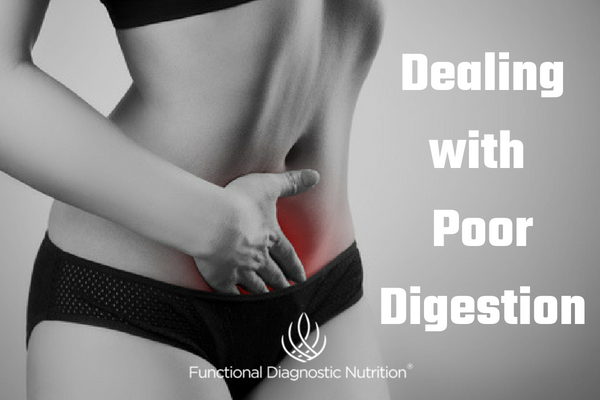Digestion woes have really come into focus in the health industry these days! IBS, GERD, leaky gut and malabsorption are just a few of the things that can plague those with poor digestion. It may seem easy to define a gut issue simply by looking at the symptoms, but in reality, there are as many symptoms as there are ailments when talking about stomach problems. In this article, we will discuss some of the basics of digestion and some healthy tips for improving it.
Do you struggle with poor digestion? If you do, you may experience some of the following common and lesser known symptoms.
Common symptoms of poor digestion are:
- Gas
- Bloating
- Indigestion
- Heartburn
- Diarrhea
- Constipation
- Nausea
What many people don’t expect, though, are these additional symptoms of poor digestion:
- Headaches
- Joint Pain
- Edema
- Skin Rashes, Itching
- Hair Loss
- Low Energy
- Muscle Loss
- Depression, Anxiety, Irritability
When we think of digestion, we always think about the stomach. The truth is digestion starts in the mouth. How we chew our food and how available saliva is makes a huge difference in how our small intestine finishes up the job. The more you chew, the more you are breaking down the food into particles. As that is happening, the enzymes (amylase) in your saliva are starting pre-digestion by breaking down carbohydrate and starches.
When the food reaches the stomach, HCl (hydrochloric acid) is released, which in turn activates pepsin. Why is this important? When you eat protein, the molecules are folded up, much like a piece of paper you keep folding into a smaller square. In order for the amino acids of protein to be released, the molecule must be unfolded by HCl and then broken down by pepsin. If this fails to happen, most commonly by low stomach acid, the amino acids will not be released and they will not be available for absorption in the small intestine. That is now food that is no longer fueling your body. For people with very low stomach acid, this can also lead to malnutrition.
Did you know….
The many symptoms of low stomach acid are the same as the symptoms of high stomach acid.
Though high stomach acid is the most common diagnosis, low stomach acid is actually the most common cause!
Digestion is completed in the small intestine along with the absorption of nutrients. Leaky gut, biofilm and dysbiosis can prevent many of the food’s nutrients from being used by your body despite how well digested it is and this also can lead to a deficiency of nutrients.
Healthy Tips:
- Chew your food well! It is even more important if missing teeth or ill-fitting dentures are preventing a thorough chewing of your food.
- Be mindful. This sounds a bit too simplistic but taking the time to determine how different foods make you feel can also help you identify which foods may be causing the issues.
- Take apple cider vinegar. taking a teaspoon of this in water, before your meal, can really aid in digestion.
- Drink your water! Not drinking enough water can slow digestion. If drinking water before a meal, make sure to drink it at room temperature and at least 15 minutes before your meal so as not to dilute your stomach acid.
- Take your time eating. Many people rush through meals, instead of taking their time. Rushing causes ineffective chewing and will contribute to poor digestion.
- Choose high quality whole foods over processed foods. The body is better able to digest whole, natural foods than processed foods.







